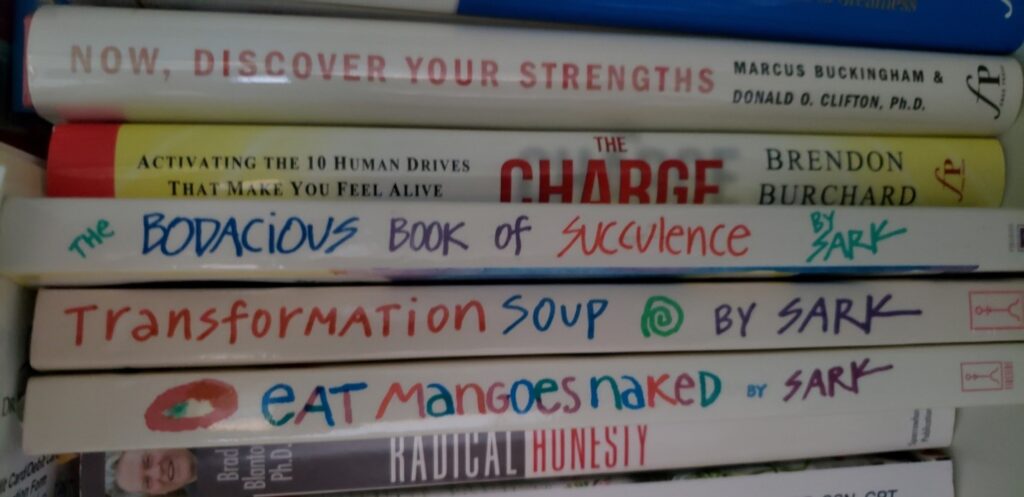Archive for August 2021
50 Inspiring Journal Prompts For Self-Awareness & Growth
Wherever you are on your journey toward a “better you,” you know that change and growth aren’t easy. Sometimes just knowing where to start is the toughest part. Something as simple as inspiring journal prompts for self-awareness can make all the difference between staying stuck and making progress.
Working on yourself is a lifetime effort and commitment. But there always seems to be that chapter of life that could be subtitled “Self-Help.”
You may delve into the reading, journaling, meditation, therapy, and support groups after a major loss or life-changing event.
Or you may immerse yourself in the effort without realizing it, inspired by self-curiosity and a hunger for growth.
You may love the work. You may dread it. And you may even wonder if there’s an end to the self-help advice and lingo that follow you wherever you go.
And you would be right in line with all the reasons that self-awareness is a practice, not a destination.
But even a practice needs a starting point.
Journaling, for example, is central to self-discovery. Writing has a way of translating your subconscious to a conscious form that confronts you with otherwise hidden truths.
It’s a ritual that adds discipline to your life while giving you time with your thoughts.
And yet, despite so much to write about, even journalists get writer’s block.
Fortunately, you aren’t the first person to embark on the search for self. And you aren’t the first to wonder where to start.
When your mind can’t nail down an idea or thought to explore, it helps to have journal prompts for self-awareness on hand.
Here are 50 to get you started:
- What are 10 things for which I’m grateful?
- Who are 5 people I admire and why?
- What are 5 things I think I’m good at?
- What are 5 things I think other people think I’m good at? Do the two lists match?
- What physical fears do I have (heights, tight spaces, airplanes, certain animals, crowds)?
- What fears about life do I have (health, talking in public, not being good enough, not having enough money, not finding love)?
- How are my fears holding me back? What things would I do if I weren’t afraid to?
- Where and when did I start having these fears? Did something specific happen to cause them?
- What is the most courageous thing I have ever done? How did I feel afterward? And how did it change my life?
- What is the kindest thing anyone has ever done for me?
- What is the kindest thing I have ever done for someone else?
- Am I taking good care of my body? If not, what are 5 specific things I can do to take better care of it?
- What 5 things/people/animals do I love most in this world? How do I feel in and out of their presence?
- What habits do I have that don’t serve me well? When and why did I develop them?
- How would my life look if I stopped 3 of my worst habits and replaced them with good habits?
- What negative mindsets do I need to release?
- What is one thing I deeply regret? And what have I learned from it?
- To whom do I still owe an apology or amends? What is holding me back?
- Who do I believe owes me an apology or amends? Am I still holding a grudge?
- Twenty years ago, how did I imagine my life today would look? Is my life better, worse, or just different than I had imagined? How so?
- How do I imagine my life looking 5 years from now? Ten years?
- If money weren’t an issue, what things would I do?
- If time weren’t an issue, what things would I do?
- What talent do I wish I had that I don’t?
- What talent do I have but not use to the best of my ability?
- Looking back, what advice would I give to myself on my high school graduation day?
- If I could change one thing about how I acted in an important relationship, what would it be?
- In what ways do I feel misunderstood by the world? What 3 things do I wish people understood about me?
- What causes me the greatest heartache?
- How would I most like to change the world?
- What do I love most about my home?
- What qualities do I look for in a friend?
- Do I like being around people?
- Do I need time to myself after work or being around a lot of people?
- How do I feel right now? How does my body feel? Do I recognize connections between what’s going on in my thoughts and what’s going on in my body?
- If I could talk to myself in the third person, what kind, validating, compassionate things would I say?
- What would the perfect day look like for me?
- What are 10 things I need to be happy?
- Am I comfortable asking for help?
- Do I believe I am a good person?
- If I were someone other than myself, would I want to be friends with me? Why or why not?
- How do I think other people see me?
- In what ways have I turned out “just like my mother/father”? In what ways am I different? What do I think of those similarities and differences?
- What hurt from my childhood has never been healed?
- Which of my responsibilities do I find distractions for? What feelings or outcomes am I trying to avoid?
- How do I handle conflict?
- What triggers me into arguments/conflict?
- What would help me feel less stressed on a daily basis?
- Do I like myself? Love myself? Enjoy time to myself?
- What makes me smile? What small thing can I do today to make someone else smile?
Somewhere near the top of this list of journal prompts for self-awareness you may have started making your own list. And that’s great! That’s the purpose of a prompt – to crack open the door so the light can flood in.
Journaling is just one of the ways that self-awareness can be developed. It’s intended to be liberating, without the guardrails of self-editing and critique.
(If you want or need journaling prompts in a guided-yet-freeing format, check out any of the colorful, fun, insightful books by SARK. Below’s a picture of 3 I have on my bookshelf.)

Self-awareness is a process, a practice, a journey of discoveries and choices based on those discoveries.
As it deepens, it grows. And the journey, if you choose, lasts a lifetime.
I’m Dr. Karen Finn and I’m a life coach. Schedule a 30-minute private consultation for support in increasing your self-awareness (and maybe get a few more journal prompts for increasing self-awareness) so you can become more you.
Looking for more information about how you better know and accept yourself? You’ll find what you’re looking for in How To Be More Self-Aware.
How To Find Reasons To Be Happy
For all the reasons to be happy in this life, there are times when everyone struggles to find them. Personal losses, relationship changes, even too much status quo — they can all put a fog over an otherwise sunny disposition.
We’ve all watched the human-interest stories at the end of the nightly news. You know, the ones that make you feel humbled by the ability of people who, in the face of tragedy, manage to stay happy.
The ones that make you want to be a better person and work on your own attitude because of someone else’s inspiring attitude.
The ones that make you remember your own childhood and the fact that children are inherently happy, even in poor countries.
And every Christmas we are reminded by the Whos in Whoville that material possessions are just bonus to genuine happiness. They aren’t the reason for it.
What is essential can’t be taken — even by a grumpy Grinch — without our permission.
So what are you supposed to do when you find yourself overwhelmed by negative circumstances and emotions? Is it possible to be happy in the midst of loss, grief, injustice, and insecurity?
Sometimes the best way to start something is to stop something. When you don’t know exactly how to find reasons to be happy, stop doing the things that prevent happiness.
Living in the past, especially with regret; holding onto grudges and not forgiving; always striving for perfection. These are just a few of the ways that you can sabotage your own quest for happiness.
These negative mindsets can also blind you to the happiness that has already been present in your life.
The short-answer, fortune cookie wisdom to the search for reasons to be happy is that happiness is a choice. It’s a perspective that you choose as a constant in a life full of unpredictability and loss.
While there are many ways to go about building a happy life, there is a common thread that, in one way or another, underlies them all.
Gratitude.
While not considered a virtue in the biblical sense, gratitude is considered the highest of virtues in the moral sense. The Roman philosopher Cicero even called it the “parent of all other virtues.”
To be in a state of gratitude is to be in a state of awareness and celebration of the gifts of the present.
To choose gratitude is to choose to seek what is good, positive, and possible in every moment, every circumstance, every person.
And, in the same way that two objects can’t occupy the same space at the same time, two thoughts can’t occupy the same brain space at the same time.
You can’t be busy looking for the good in the world and simultaneously stewing in anger or fear.
Gratitude helps you find reasons to be happy because it’s a mindset of recognizing sources of happiness.
It’s what makes you slow down and consider the gifts of the moment. The breeze that just swept through your hair. The ladybug on a flower. A warm day in winter.
The stranger who smiled and waved. The just-because card in your mailbox. The forgiveness from someone whose feelings you had hurt.
The simple meal you made for dinner. The exhausting workout you had. The pound you lost.
One more day of sobriety. Two bags of clothes cleared out of your closet. Three grandchildren coming to visit.
The reason gratitude is directly linked to happiness is that it puts a positive spin on the past, present, and future.
Of all the things you could focus on in your past, gratitude will draw to mind all the ways you have been blessed. It will remind you that you have always been provided for, even against the odds.
And isn’t it amazing that you can, from where you stand today, transform the power of your memories of the past?
In the present, gratitude opens your heart and prepares it to see all that is good. It sets your radar on high alert for the infinite reasons for happiness.
Even when you find yourself confronted by negativity or injustice from other people, you will find the kernel of goodness.
You will seek to learn something from those with different opinions and beliefs.
And you will marvel at your own ability to allow love and respect to rise above the need to “be right” or win an argument.
All because your heart is aware of goodness. And your heart’s awareness becomes your mind’s attitude.
Gratitude can even shape your future by giving you hope and trust that good things will come. You have already conditioned yourself to know that you will find goodness because you always look for it.
I’m sure you want to know how to create a happy and healthy life for yourself. Who doesn’t?
But did you know that gratitude is directly linked to health, in part because it motivates you to do healthful things?
So, all those happiness-inducing activities like exercising, getting out into nature, and eating well are all rooted in gratitude.
The realization that life is a fragile gift not to be taken for granted is inspiration to take care of it.
Happy people are more active and take better care of themselves. They feel better. Their pain tolerance is higher. They don’t become entrenched in little irritants.
Exercise, for example, releases endorphins. Endorphins make you feel happy. Feeling happy within yourself makes you want the world to feel happy, too.
And, as is always the case with doing good things for yourself or others, goodness begets goodness.
Wanting others to be happy and healthy energizes you to reach outside yourself to help them. It also requires that you want yourself to be happy and healthy too.
And, no surprise here, being generous and volunteering your time and resources eventually circle back to increase your own happiness.
Finding reasons to be happy doesn’t have to be an epic search for the Holy Grail. It’s a mindset, not a quest.
And nowhere is happiness more powerful than in the most mundane activities that make up the majority of life.
Sometimes happiness is as simple as singing a Disney song while doing the dishes, or feeling indulged by clean sheets on the bed.
And it is always as simple as prioritizing the happiness of someone else.
I’m Dr. Karen Finn and I’m a life coach. Schedule a 30-minute private consultation for support in putting together the pieces so you can create a happy and healthy life for yourself.


